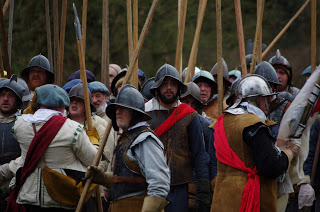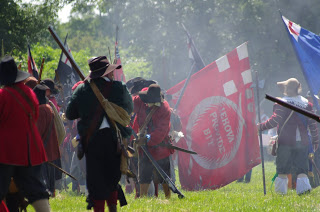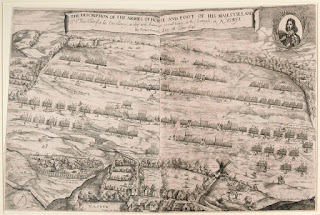The ECW Travelogue made a packed lunch (or as we in Derbyshire say 'a pack up'), and headed over the border into Welsh Wales. Wrexham to be precise.
Chirk Castle is in the care of the National Trust, so expect the obligatory café, and shop selling fudge and wooden swords.
Built in the late thirteenth century, Chirk was part of Edward Longshank's chain of castles across North Wales.
From a Civil War point of view we'll fast forward to 1593 when the Myddleton family bought the property. Sir Thomas Myddelton II was an MP having represented Weymouth and Melcombe Regis in the 1620s, before he represented Denbighshire in 1625, then again 1640-1648.
 |
Sir Thomas Myddleton II
|
The area around Chirk was on the whole sympathetic to the Crown, so it was somewhat unusual that Sir Thomas declared for Parliament.
At the outbreak of war he was made Sergeant Major General of the Parliamentary forces in North Wales, and went off campaigning.
In the summer of 1642 he returned to Wales to 'use his influence' to persuade the Welsh to side with Parliament. As a consequence the Royalist Colonel Robert Ellice seized Chirk Castle, in his absence in January 1643. A garrison was placed there under Sir John Watts, which remained in control of the castle for the rest of the war. Myddleton attempted to take his home back in December 1644, but failed after three days. The family eventually regained control of the castle by bribing the Royalist garrison.
Myddleton stood down from his commission due to the Self Denying Ordinance, and he returned, full time, to Parliament.
Myddleton did not agree with the Trial of Charles I, and he was expelled from Parliament. He would later join Booth's Rebellion in 1659, attempting to reinstate the monarchy. Chirk would be besieged by Lambert, the castle garrison surrendering to Parliament's forces in August. Myddleton and his brother were sent into exile. The castle sustained considerable damage to it's eastern side.
For more on Booth's Rebellion see here.
Sir Thomas's support for the Rebellion put him in favour with Charles II, and he received a number of items from Charles II in gratitude for his support.
What's There Now?
The original medieval fortress was converted into a comfortable Tudor residence by Myddleton's father. The damage caused by Lambert was rebuilt during the Restoration. The Castle's interior was extensively 'gothicised' in the 1840s by the Victorian architect Pugin.
The Cromwell Room is used to display the castle's armoury - one of the largest armouries still in situ. The 'Cromwell Room' was remodelled by Pugin into the faux Jacobean panelled room that we see today.
There are 38 muskets on display, a number of harquebusier's cuirasses and helmets, some basket hilted broadswords, a number of halberds, some stirrups resplendent in layers of gloss Victorian paint.
Tucked away in the corner is one of the oldest British military drums in existence. The National Trust online catalogue lists it as a 'militia drum circa 1679'. The catalogue in the castle describes it as "almost certainly one of two drums purchased in 1679 for £3.00 from Richard Porter of Chester by Hugh Matthews, drummer, of Wrexham" and is believed to have been used by the Denbighshire militia.
 |
| A zischagge inspired helmet |
Many of the 'lobster pots' don't have a visible comb so would appear to be of the 1660-1680 pattern, which would put them contemporaneously alongside the drum.
 |
| A very impressive hat box |
Also on display, is a very fine pair of bucket top boots.
Elsewhere in the castle there are a number of interesting family portraits from the time, along with portraits of Charles II and James II, along with a chest given to the family by Charles II as reward for supporting his cause in the Booth Rebellion.
 |
| Lambert in the long gallery (lighting reflections sometimes require strange photo angles!) |
Somewhat curiously a portrait, believed to be of Lambert hangs in the long gallery. Which does beg the question why would you have a portrait of the man who led the destruction of the castle, in the very castle that he tried to destroy?
 |
| 'The King's bed' |
The castle proudly boasts of its 'King's bedroom'; although the National Trust must be given credit for clearly stating the real facts about the room. Charles definitely visited and stayed at the castle, but it is not known which room was used for his overnight stay (or even if that room still exists). The long gallery wing (where the current 'King's bedroom' is located) was seriously damaged during the siege, demolished and rebuilt after the Wars. The bed that proudly bears a Victorian plaque stating that Charles slept in this bed on September 22nd and 28th 1645 is a little problematical, as it wasn't made until fifty years after Charles's execution.
 |
| View from the doorway |
It is a real shame that there is no public access to 'the King's bedroom' as there are a number of interesting artefacts on display (sadly not visible from the doorway): an original Streeter's plan of Naseby, some framed letters (including one bearing Charles I's signature), and some portraits of Charles 'after Van Dyck'.
Of course it wouldn't be a National Trust property without an army of volunteers, and I really must say that it was a breath of fresh air to talk to one of the volunteers on my most recent visit. He really knew what he was talking about, as opposed to the usual nonsense that passes for commentary and equates everything Civil War to Cromwell desecrating buildings and stabling horses in beautiful buildings.
So well done Chirk and your fabulous staff and volunteers who know that the Wars aren't just limited to the English Civil War, and know all about Lambert and Booth's Rebellion.
Sir Thomas Myddelton is buried in St Mary's Church, in the village, and has a very imposing memorial which bears a very good likeness to his portrait: which one would hope seeing as his 'main' portrait was painted after his death, the artist is believed to have used this bust as the model.
Postcodes for SatNavs
Chirk Castle, Wrexham LL14 5AF
St Mary's Church, Chirk LL14 5HD
If you enjoyed reading this, or any of the other posts, please consider supporting the blog. Thanks.




























Comments
Post a Comment